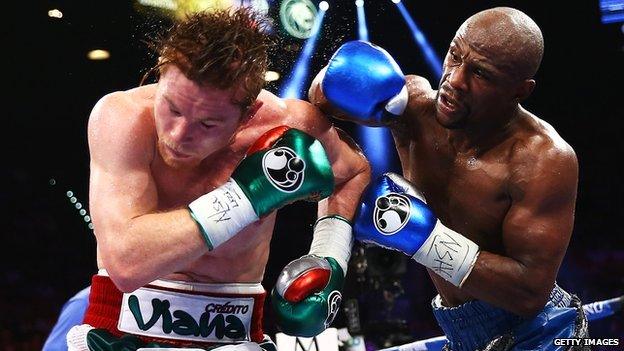Climate pause takes a wallop as IPCC comes out swinging
- Published
- comments

Ker-pow! The IPCC was sheepish on the pause in its draft report; but more bullish in the final publication
In the heady atmosphere of the old Munich brewery where they had been ensconced for the past four days, there was a real sense of determination among the scientists of the Intergovernmental Panel on Climate Change (IPCC).
With the release of their eagerly anticipated report on Friday, the UN climate panel didn't just want to warn the world that warming was unequivocal, and that humans were responsible. No, they wanted to have a go at the people who have made their lives a bit miserable in recent times, the climate sceptics and deniers.
And while not renowned for their skills in matters pugilistic, at the launch of the summary for policymakers in Stockholm, the grey men definitely came out swinging.
The panel has been on the back foot for some time, as interest in global warming waned, and focus had been fixed by sceptical voices on the so-called pause or hiatus. This refers to the observation that, since 1998, there has been no significant global warming despite ever increasing amounts of carbon dioxide being emitted.
Even in the final draft of this report, the IPCC was putting forward a number of theoretical ideas behind the fall-off in temperature rises over the last 15 years, and was sheepishly acknowledging that its models failed to predict the slow-down.
But over the four days of negotiations with governments here in the Swedish capital, the UN body discovered its backbone.
So the pause was not ignored or buried, but was, in science terms, given a ferocious kicking.
Come and have a go...
"Due to natural variability," the report says, "trends based on short term records are very sensitive to the beginning and end dates and do not, in general, reflect long term trends". Biff!
And the ladies and gentlemen of the press also get a bit of a battering for making too much noise about the pause.
"I don't think it was the IPCC fighting back," said Prof Arthur Petersen, a member of the Dutch government's team.
"But we had a co-chair who said we should really look at the science and not look at what's out there in the media."
Climate sceptics were also on the mind of several other scientists involved with this first working group of the IPCC.
But they weren't talking about bloggers or newspaper columnists, they were talking about governments.
Most of the 13 Australians among the lead authors and contributing authors were selected in the time of a Labour government that favoured action on climate change and a carbon tax.
But now they have been replaced by a more avowedly sceptical Liberal party.
"My attitude is I'm interested in the science and I'm going to report what I believe the science is telling us regardless of what the government says," said Dr John Church, the Australian convening lead author on sea level rise.
This chapter is one of the big improvements in this report compared to 2007. There is much more detail on the likely ranges of the rising waters, as the models now take the impact of Greenland and Antarctica into account.
And Dr Church embodies the new combative spirit of the IPCC.
"You won't have any effect on adaptation or mitigation of climate change, if you keep quiet - you have to speak out," he says.
But he conceded that the recent change of government in Australia had crossed his mind.
"Yeah I have thought about that issue - but I am far enough advanced in my career that I can say what I like… I can speak the truth."
It will be interesting to see how the sceptics respond.